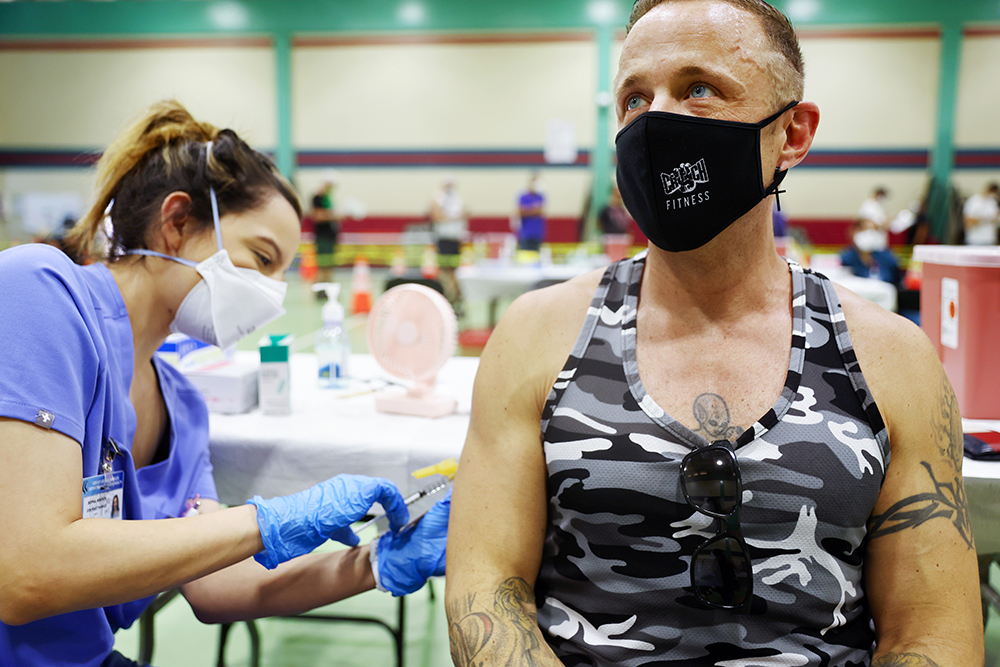
猴痘是性传播疾病吗(STD)?
到目前为止,在全球猴痘爆发的近48,000例病例中,绝大多数发生在与同性发生性关系的男性身上,新近研究已经在精液中发现了该病毒。世界卫生组织的官员在7月也表示,猴痘可能与“性接触”有关。
但性生活中通常会传播病毒的密切接触行为也有可能不会导致传染。精液中发现的病毒并不意味着精液是导致感染的原因。世界卫生组织称,仍在评估最近变异病毒的传播途经。
流行病学家则表示,密切接触传播和性传播之间很难区分。
不管怎样,对普通人来说,这些可能并不重要。
“疫情爆发之际,讨论过多反而分散注意力。”美国国家性病联盟董事会的执行主任戴维·哈维告诉《财富》杂志。
模糊的类别
专家说,之所以出现该问题,主要是因为针对性传播疾病或感染没有明确的定义。
哈维和其他专家指出,很大程度上讲,猴痘是否属于性传播感染(STI)取决于语义表述。争论点在于,潜在致命的病毒是否仅仅是性途经“可传染”(显然是),还是真正的性“传染”。
“说实话,性传播感染的定义相当随意。”阿拉巴马大学伯明翰分校(University of Alabama Birmingham)的马尼克斯·赫尔辛克医学院(Marnix E. Heersink School of Medicine)的传染病教授爱德华·胡克博士在接受《财富》杂志采访时表示。
“接吻会感染流感,接吻也会感染链球菌性咽喉炎,但人们没有将其归入性传播感染。”胡克说,他还担任美国性健康协会(American Sexual Health Association)的科学顾问。
寨卡病毒(Zika)和埃博拉病毒(Ebola)也可以通过性分泌物传播,只是不常见,“人们认为这些病毒不属于性传播。”哈维说。
哈维指出,疱疹、梅毒和衣原体感染等等众所周知的性病并不完全通过性传播,也能够通过其他方式传播,例如分娩。
胡克指出,丙肝也经常被认为是性病,然而实际上很少通过性传播,其他传播方式才更常见,比如吸毒期间共用针头。
双刃剑
胡克说,宣布猴痘为性病有一定好处,因为一些保单规定只有纳入性病范畴才可以覆盖猴痘免费诊断和治疗,这对无力支付治疗费用的人以及公共卫生和安全都有极大益处。
但也存在缺点,就是污名化,其实不管猴痘还是性传播感染预防都会受之影响。
“美国在性和性健康方面的污名问题尤其严重。”胡克说。“这会妨碍人们积极治疗。不少患者不愿意要求检查,也不愿意提供详细的(医疗)记录,从而推动持续传播。”
无名火不仅让患者不愿意开口,也影响医生提问。他补充说,如果患者对谈论性感到不舒服,医疗方可能就选择不询问患者的性生活史,也可能不检测性传播疾病。
“出于种种原因,以往美国报告的淋病和梅毒等性传播感染发病率在西方世界都是最高的,而且花的资金更多。”他说。
专家表示,猴痘显然与性有关,但重点应该是坦率对话,用正确的信息教育公众。不应该浪费时间钻牛角尖。
“我认为,现在必须关注的是如何战胜疫情。”哈维说。“这意味着不要过于纠结术语,避免污名化,提供对健康有益的明确信息教育公众。”(财富中文网)
译者:夏林
猴痘是性传播疾病吗(STD)?
到目前为止,在全球猴痘爆发的近48,000例病例中,绝大多数发生在与同性发生性关系的男性身上,新近研究已经在精液中发现了该病毒。世界卫生组织的官员在7月也表示,猴痘可能与“性接触”有关。
但性生活中通常会传播病毒的密切接触行为也有可能不会导致传染。精液中发现的病毒并不意味着精液是导致感染的原因。世界卫生组织称,仍在评估最近变异病毒的传播途经。
流行病学家则表示,密切接触传播和性传播之间很难区分。
不管怎样,对普通人来说,这些可能并不重要。
“疫情爆发之际,讨论过多反而分散注意力。”美国国家性病联盟董事会的执行主任戴维·哈维告诉《财富》杂志。
模糊的类别
专家说,之所以出现该问题,主要是因为针对性传播疾病或感染没有明确的定义。
哈维和其他专家指出,很大程度上讲,猴痘是否属于性传播感染(STI)取决于语义表述。争论点在于,潜在致命的病毒是否仅仅是性途经“可传染”(显然是),还是真正的性“传染”。
“说实话,性传播感染的定义相当随意。”阿拉巴马大学伯明翰分校(University of Alabama Birmingham)的马尼克斯·赫尔辛克医学院(Marnix E. Heersink School of Medicine)的传染病教授爱德华·胡克博士在接受《财富》杂志采访时表示。
“接吻会感染流感,接吻也会感染链球菌性咽喉炎,但人们没有将其归入性传播感染。”胡克说,他还担任美国性健康协会(American Sexual Health Association)的科学顾问。
寨卡病毒(Zika)和埃博拉病毒(Ebola)也可以通过性分泌物传播,只是不常见,“人们认为这些病毒不属于性传播。”哈维说。
哈维指出,疱疹、梅毒和衣原体感染等等众所周知的性病并不完全通过性传播,也能够通过其他方式传播,例如分娩。
胡克指出,丙肝也经常被认为是性病,然而实际上很少通过性传播,其他传播方式才更常见,比如吸毒期间共用针头。
双刃剑
胡克说,宣布猴痘为性病有一定好处,因为一些保单规定只有纳入性病范畴才可以覆盖猴痘免费诊断和治疗,这对无力支付治疗费用的人以及公共卫生和安全都有极大益处。
但也存在缺点,就是污名化,其实不管猴痘还是性传播感染预防都会受之影响。
“美国在性和性健康方面的污名问题尤其严重。”胡克说。“这会妨碍人们积极治疗。不少患者不愿意要求检查,也不愿意提供详细的(医疗)记录,从而推动持续传播。”
无名火不仅让患者不愿意开口,也影响医生提问。他补充说,如果患者对谈论性感到不舒服,医疗方可能就选择不询问患者的性生活史,也可能不检测性传播疾病。
“出于种种原因,以往美国报告的淋病和梅毒等性传播感染发病率在西方世界都是最高的,而且花的资金更多。”他说。
专家表示,猴痘显然与性有关,但重点应该是坦率对话,用正确的信息教育公众。不应该浪费时间钻牛角尖。
“我认为,现在必须关注的是如何战胜疫情。”哈维说。“这意味着不要过于纠结术语,避免污名化,提供对健康有益的明确信息教育公众。”(财富中文网)
译者:夏林
Is monkeypox an STD?
By now we know that a vast majority of the nearly 48,000 cases in the global monkeypox outbreak have occured in men who have sex with men, that recent studies have identified the virus in semen, and that World Health Organization officials said in July that it may be linked to “penetrative contact.”
But the kind of close contact that occurs during sex and often spreads the virus can occur apart from it, too. The virus being found in semen doesn’t mean the fluid is responsible for infections. And the WHO says it’s still assessing just how transmission occurs with a virus that appears to have recently mutated.
It’s just really difficult to tease apart close-contact spread from sexual spread, epidemiologists say.
And none of it may matter—not to the average person, anyway.
“At this point in the outbreak, the debate is somewhat of a distraction,” David C. Harvey, executive director of the National Coalition of STD Directors, told Fortune.
A nebulous category
Part of the issue here is there’s actually no one set definition for sexually transmitted diseases or infections, experts say.
Whether or not monkeypox is an STI is largely a case of semantics, Harvey and other experts say. The argument: whether the potentially deadly virus is merely sexually “transmissible” (it is, clearly) or if it’s truly sexually “transmitted.”
“The definition of what an STI is, is, quite honestly, pretty arbitrary,” Dr. Edward Hook, a professor of infectious diseases at the University of Alabama Birmingham’s Marnix E. Heersink School of Medicine, told Fortune.
“You can get influenza from kissing, or strep throat from kissing, yet we don’t call them STIs,” said Hook, who’s also a scientific advisor to the American Sexual Health Association.
Although uncommon, Zika and Ebola can also be transmitted through sex via gential secretions, “but we don’t consider them sexually transmitted,” Harvey said.
Some well-known STDs, such as herpes, syphilis, and chlamydia, aren’t exclusively sexually transmitted and can be passed along in other ways, like through childbirth, Harvey pointed out.
And another disease commonly thought of as an STD, Hepatitis C, is actually rarely transmitted through sex and is more commonly transmitted through other means, like sharing needles during drug use, Hook pointed out.
A double-edged sword
There is a certain advantage to declaring monkeypox an STD: Some insurance policies require no-cost diagnosis and treatment of such, Hook said—a significant benefit to those who couldn’t afford treatment otherwise, and to public health and safety.
But there’s a downside, too: stigma, which hampers prevention efforts of monkeypox and all STIs, to be frank.
“America in particular has a problem with stigma related to sex and sexual health,” Hook said. “It keeps people from seeking care. It makes patients unwilling to ask for tests and give appropriate [medical] history, and therefore promotes continued transmission.”
Stigma doesn’t just keep patients from talking—it keeps doctors from asking. Health care providers may choose to not ask patients for sexual histories, or to test for sexually transmitted diseases, if they’re uncomfortable talking about sex, he added.
“For these reasons, the U.S. has the highest rates of traditionally reported STIs like gonorrhea and syphilis in the entire Western world—despite spending more money” on the issue than any other region, he said.
Monkeypox is clearly sexually associated, experts say. The focus should be on educating the public with accurate information, through frank conversations. Time shouldn’t be wasted splitting hairs.
“I think what we have to focus on these days is how we’re going to conquer this outbreak,” Harvey said. “And it means not getting wrapped up in the term, avoiding the stigma, and educating people explicitly with the information they need to protect their health.”






